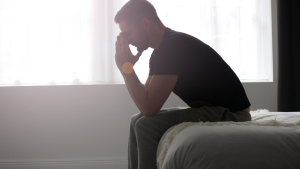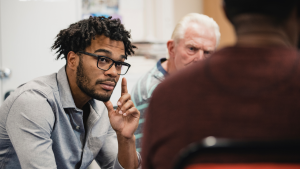By Nelo A. Hamilton, Jr., Junior Warden
As Freemasons, we are taught to aide those in distress, more especially a brother Mason. When imaging someone in distress, we often think of someone with a broken-down car or an individual approaching us on the street to ask for money. It is important, however, to recognize that the signs of distress aren’t always so obvious. As a fraternity, Masonry should cultivate an environment and foster relationships where the Brethren feel that they can be honest and open with one another about their mental health without stigmas or judgement being attached. It should also equip our members with the knowledge and skills to aide a Brother who confides in them.
A study by the Boston School for Mental Health found that 32.8% of adults in the US experienced elevated symptoms of depression in 2021. Additionally, 27.8% of adults in the US reported elevated symptoms of depression in 2020, compared to 8.5% before the COVID-19  pandemic, indicating that depression rates are poised to remain high. According to the Centers for Disease Control (CDC), the overall percentage of adults with recent symptoms of anxiety or a depressive disorder increased from 36.4% to 41.5% from August 2020 to February 2021.Considering the challenges we’ve faced as a country and society over the last couple years, including the COVID-19 Pandemic, civil unrest, a contentious election, social isolation, the fact our lives have changed so drastically for such a long period of time and ongoing economic uncertainties, there is little surprise that we would feel some drastic effects on our mental health.
pandemic, indicating that depression rates are poised to remain high. According to the Centers for Disease Control (CDC), the overall percentage of adults with recent symptoms of anxiety or a depressive disorder increased from 36.4% to 41.5% from August 2020 to February 2021.Considering the challenges we’ve faced as a country and society over the last couple years, including the COVID-19 Pandemic, civil unrest, a contentious election, social isolation, the fact our lives have changed so drastically for such a long period of time and ongoing economic uncertainties, there is little surprise that we would feel some drastic effects on our mental health.
The Worshipful Master’s mission this year is a significant first step in creating an environment where mental health is both normalized and prioritized, especially among men. Speaking openly and honestly about our mental
health is a critical step towards removing the stigma surrounding it. It is incumbent upon our leadership and members to hold honest conversations about depression and anxiety in order to create an environment where a struggling Brother feels comfortable seeking support. Although it may be outside the primary theme of their year, moving forward it is crucial that future Masters of AW22 continue to highlight mental health and establish the Lodge as a support system.
 When a Brother reaches out, our first priority should be to listen. This does not mean offering advice or opinions, but instead actively listening to what is being said and offering understanding. According to the Mayo Clinic, listening and understanding can be a powerful healing tool. After that initial conversation, keep an open line of communication and check in often to see how they are doing. Encourage further help and point them towards organizations such as the National Alliance on Mental Illness (www.nami.org). Familiarize yourself with the resources available. As individuals, we must be aware of our own wellbeing while also educating ourselves on how to be there for our Brethren. When we recognize a Brother is exhibiting symptoms of depression or anxiety, be proactive by genuinely asking how they are and lending a listening ear. Remember your obligation.
When a Brother reaches out, our first priority should be to listen. This does not mean offering advice or opinions, but instead actively listening to what is being said and offering understanding. According to the Mayo Clinic, listening and understanding can be a powerful healing tool. After that initial conversation, keep an open line of communication and check in often to see how they are doing. Encourage further help and point them towards organizations such as the National Alliance on Mental Illness (www.nami.org). Familiarize yourself with the resources available. As individuals, we must be aware of our own wellbeing while also educating ourselves on how to be there for our Brethren. When we recognize a Brother is exhibiting symptoms of depression or anxiety, be proactive by genuinely asking how they are and lending a listening ear. Remember your obligation.
The harsh reality is that, according to the American Society for Suicide Prevention, suicide is the 12th leading cause of death in the United States, with 45,979 Americans dying by suicide in 2020 and a staggering 1.2 million attempts. Of these, men died by suicide 3.88 times more than women. Let those numbers sink in for a moment. For some men, the Lodge is their primary – or only – support system; we must be there for one another.
In addition to further promotion of mental health, AW22 will be working to compile a list of helpful resources to be made available for the Brethren on the Lodge’s website. Let’s challenge ourselves to continue having these conversations and equip our Lodge with the working tools necessary to go out of our way to aide our distressed Brethren before it too late.
–
At the time of writing, Nelo Hamilton serves as the Junior Warden of Alexandria-Washington Lodge No. 22 . The views outlined in this article are those of the author and do not represent those of Alexandria-Washington Lodge No. 22 or the Most Worshipful Grand Lodge, A.F. &A.M. of the Commonwealth of Virginia.



